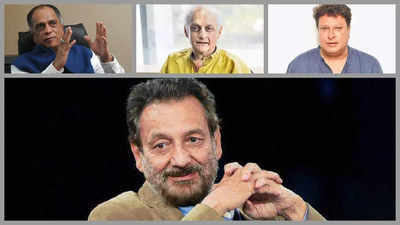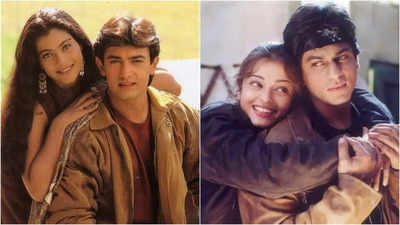The digital streaming boom has transformed the way audiences consume content, offering filmmakers more creative freedom than traditional television or cinema. However, Shekhar Kapur’s Recent Criticism of an ott platform for allegedly editing ‘Bandit Queen‘Without his consent has reigned the debate on creative control and censorship. Kapur Questioned Whether Similar Treatment would be given to a filmmaker like Christopher Nolan, Sparking Discussions About Whethar Indian Filmmakers face great great Counterparts.
Shekhar Kapur’s Allegations: A Violation of Creative Rights?
Kapur Took to Social Media to Express His Frustration Over the edited version of ‘Bandit Queen’ Being Streamed without His Permission. The film, originally released in 1994, is a hard-Hitting portrayal of Phoolan Devi’s life and has been widely recognized for its unflinking narrow. Kapur’s Concern Raises an important question: do ot platforms have the right to modify a filmmaker’s work without their approval?
Reacting to Shekhar’s post on X, Hansal Mehta Wrote, ‘It is sad to know that a film that should always be India’s’Me Pride Gets Gets Treated This Way. But then what’s new? We’ve become so used to being treated as slaves of the west. No protest. No pushback. Total Submission. Because they are doing us a favor. Our integrity as artistes is Neither Protected by us or by a guild that grown potentially protect us. The So-Called ‘Association’ is Busy Behaving Like a Political Party or Stoking Divisive Propaganda. In the meaning of the directionors are rendered powerless and bereft of any support system. Maybe your status as one of the country Foremost Artistic Spokesperson to the World and as a Government Decorated Padmabhushan will help brings about change. Until then Back to our submissive selves? Members of the new content driven colony that creates cattle feed to drive subscriptions while fulfilling the artistic Ambitions of its western masters. ‘
Actor-Director Tigmanshu Dhulia Shared, “The way the platform has edited the film-I’ll have to watch the entrere movie to fully undersnd what has been cut. That Certification is for the UAE. Behind Making It UAE-CERTUDED?
He further added, “Shekhar Kapur Never Claimed That The Director wasnys Platform.
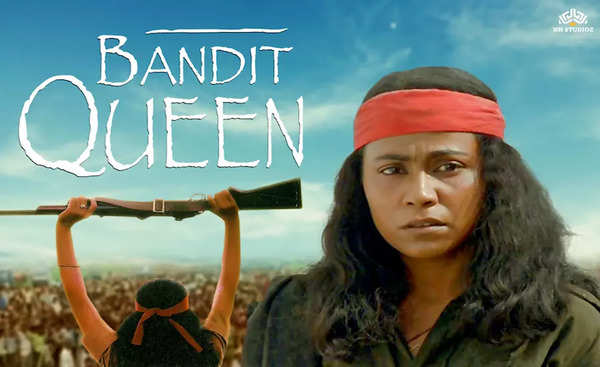
What Amazon prime Had to say:
Prime Video spekesperson Told Etimes, “prime video has not made any edits to the version of the film bandit queen currently streaming on the service. The version is available on prior video is the verse video Film’s Distributor, Nh Studioz. “
A history of post-Release edits in Bollywood and Hollywood:
This is not the first instance where films have been al alese. Several Filmmakers, Both in India and Internationally, Have Faced Similar Challenges:
Hollywood cases:
‘Brazil’ (1985)
Director Terry Gilliam Had to Fight Against University Pictures, which attempted to re-edit his dystopian film to include a more optimistic ending, complete altering the narrama.
‘Once upon a time in America’ (1984)
Sergio Leone’s Original 269-Minute Cut was slashed to 139 minutes for the American release, affecting its storytelling and character development.
3.’Dune ‘(1984)
David lynch disowned the heavily edited theatrical version of his film, which was cut down from his intended three-her Runtime.
‘Back to the future part II’ (1989)
Netflix Edited out a Scene from the film without informing the filmmakers, Later restoring the original cut after backlash.
‘Splash’ (1984)
Disney+ altered a Scene using CGI to Extend a character’s hair to cover nudity, lead to criticism for its unnecessary censorship.
Bollywood cases:
Udta Punjab ‘(2016)
The film Filed Heavy Censorship from the CBFC, with Several Scenes Being Removed Despite The Filmmakers’ Objections.
‘Lipstick under my burkha’ (2017)
Initially denied Certification for Being “Lady-Oriented,” The film was Eventally released with edits.
‘V’ (2020)
The bombay high court directed amazon prime to take down the telugu film after a model’s image was used without consent in a derogatory manner.
Tigmanshu also shared a similar ordeal that he faceed with his show, ‘The Great Indian Murder’. He shared, “My show on disney+ hotstar was edited without my knowledge. These platforms do whatver they want without consulting the director. “
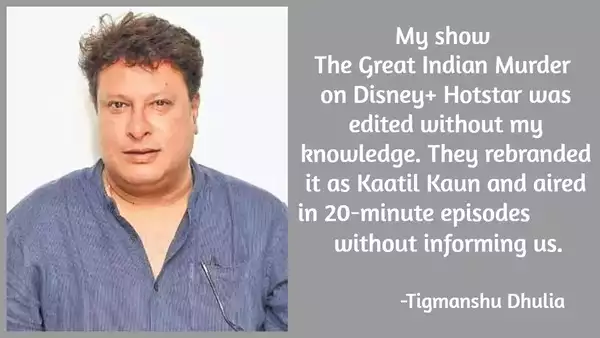
Meanwhile, Mukesh Bhatt Added, “This is the first time I am hearing of such a case. Significant cultural nudity, which is problematic under today’s censorship norms. Be Surprising, some argue that Indian filmmakers are treated different from from Hollywood directions. “
Ott Censorship: A double Standard?
Kapur’s Comparison to Christopher Nolan Raises A Key Issue: Would Hollywood Auteurs Like Nolan or Martin Scorsese Face Similar Edits with Consent? The general perception is that Hollywood filmmakers have Greater Control Over their work, whereas Indian filmmakers often face interventions, whither from censor boards, distrustrs, distrustors, distrustors, or ottforms.
Mukesh bhatt weighed in, “No, I don’t believe Hollywood and Indian Filmmakers are treated differently. It depends on how a producer handles the situation. OUTRAGE Over the edits is undressable, but at the end of the day, the film’s fate lies with the producer, not the director. “
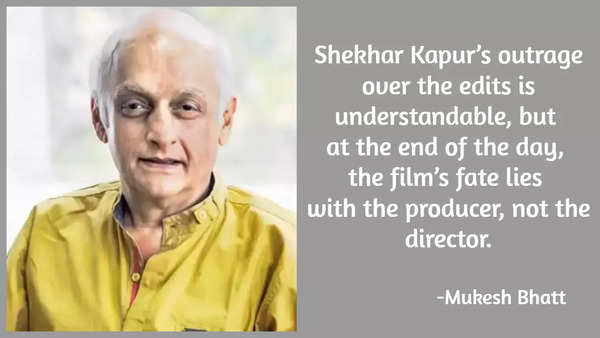
Producer and Former Chairperson of the Central Board of Film Certification, Pahlaj Nihalani Shared, “Certain Scenes May have been edited due to Voluntary Censorship Rules. Display of Obscenity, and Films Depicting Rape or Similar Sensitive Content Might Be Altered According Contract include a clause allowing modifications, then the producer has full control over edits, leaveing the director with no say in the matter. “
He added, “Once the producer cells the content, the buyer – the buhether an ott platform or a satellite network -gains the rights to modify and present the film as they Dub The Content INTO Different Languages, or even restructure it. Television Distribution, The Producer’s Involvement is minimal. “
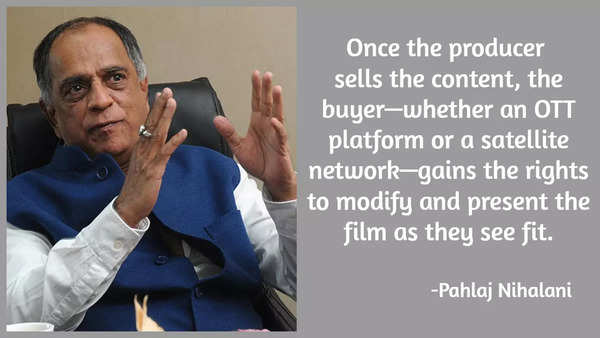
Talking about Shekhar Kapur’s Film, He Said, “Regarding Bandit Queen, The Film Originally Facted Legal Scrutiny Due to its Bold and Controversial Content. It was taken to counte It was passed for release. Contractual Agreements. “
He added, “Shekhar Kapur Claimed he was unaware of the changes made to bandit queen. But legally, the key question is: who signed the agrement? If the producer authorized these changes is in the construct, the same changes in the comput Right to do. Modifications for different markets. “
“As for creativity, it holds significance during the film’s initial release. However, Once the Rights are Sold, The Terms of the Agreement Between The Produce and the DISTRIBUTOR BCOMETOR BCOMETOR BECAMENT. Producer has authorized modifications, then the new rights holder has the final saying, “He concluded.
Legal and ethical implications
The practice of modifying films post-Release Raises Legal and Ethical Concerns. Filmmakers Hold Creative Rights to their work, and unauthorized edits may Violate copyright laws. Streaming platforms should be transparent about any intended modifications and seek approval from filmmakers. Altering Films without Acknowledgments Misleads Audiences and Compromises the Director’s original vision.
Producer Mukesh Bhatt Told Etimes, “Shekhar Kapur was not the owner or producer of bandit queen -he was only the director. The producer must have sold the ott Rights to amazon prime. Not Legal, Obligation required to do so. “
He Further Added, “A Director is a Paid Professional with no Ownership Rights over the Intellectual Property (IPR) of the film. Once the Director is Paid Their Fee, The Responsibility is the responsibility Producer, Who Retains Complete Control Over How the Film is handled. If an ot platform requests cuts, it is ultimately the producer’s decision to approve Platform May Deny Streaming Rights. If the relationship between the producer and director is strong, discusations may take place. “
The Filmmaker’s Perspective: Seeking a Solution
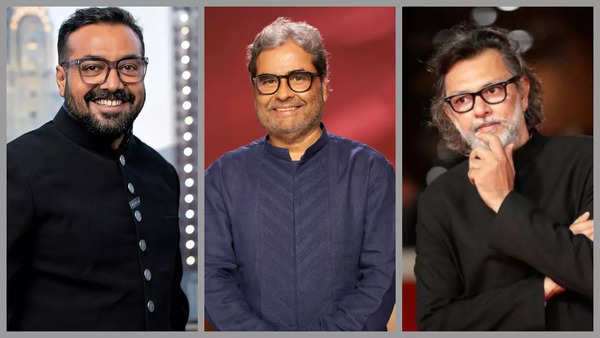
Several Indian filmmakers have expressed Concerns about Creative Control in Cinema. Anurag kashyap has consistently opposed interference in his films, Advocating for unfilted storytelling. Vishal Bhardwaj has emphasized the need for clear censorship guidelines, especially for digital platforms. Similarly, rakesh omprakash mehra has stressed the importance of Respecting Artistic Integrity.
The future of creative freedom in the streaming era
To prevent further conflicts, ott contracts should include a director’s approval clause, ensuring that no edits are made without the filmmaker’s Consent. Additional, Platforms must Establish Transparent Content Guidelines, Clearly Outlining Modification Policies and Informing Audiences about any changes. Furthermore, Industry Regulations Should Be Strengthed, With Filmmaker Association and Industry Bodies Advocating for Legal Safeguards Against Unauthorized Edits.
Conclusion
To Safeguard Creative Integrity in the Streaming Era, It is Crucial for Filmmakers, Producers, and Ott Platforms to Establish Clear Guidelines on Post-Release on Post-Release Modifications. A Director’s Approval Clause also unauthorized edits while ensuring transparency. Ultimately, The Debate UndersCores the need for a balanced approach – respecting artistic vision while accounting distribution requirements.
